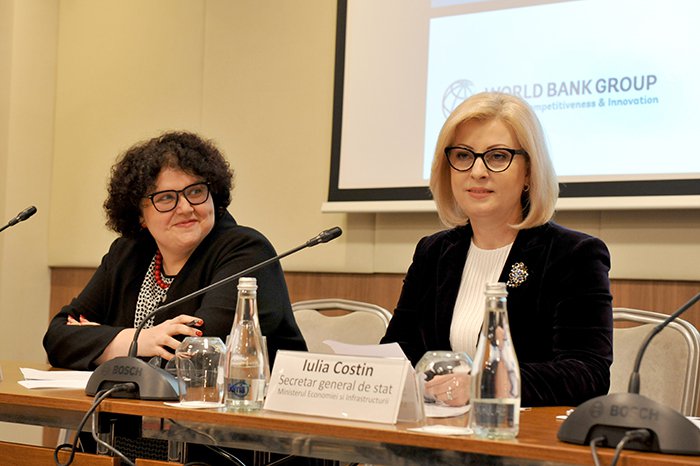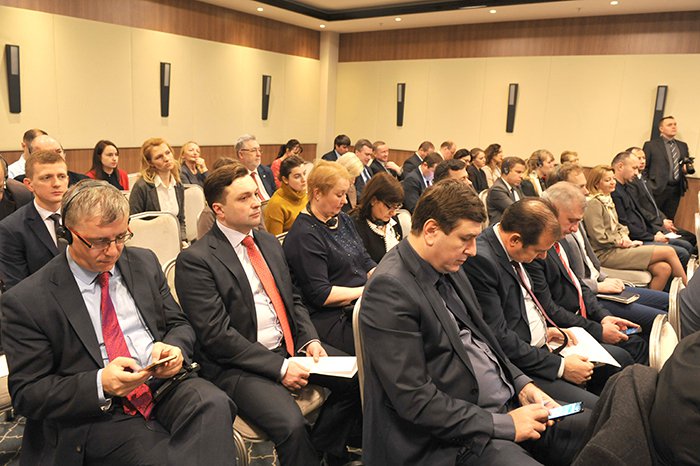World Bank's study shows stagnation of business regulation cost in Moldova
15:28 | 20.02.2018 Category: Economic
Chisinau, 20 February /MOLDPRES/ - The degree of state’s involvement in the work of enterprises in 2017 remained at the level of the year before, of 7.9 per cent. The subsequent improvements will take place only if the reforms underway are enforced. These are some of the conclusions of a study titled, Business Regulation Cost 2017, unveiled by the World Bank Group and the Moldovan government today.
The goal set for 2020 in the Strategy of Development of Small- and Medium-sized Enterprises is of seven per cent.
“The ensuring of good conditions for doing business and enhancement of the business’ trust in the state bodies is one of the principal priorities on the government’s agenda,” State Secretary at the Economics and Infrastructure Ministry Iulia Costin said. The official noted that, during 2017, the government had promoted a string of reforms, the need of which was dictated by the study carried out for 2016, and which were focused on improving the business environment, creating attractive conditions for doing business in Moldova.
In the context, the state secretary touched upon the cut in the number of permissive acts from over 400 to 151 and of the control bodies from 62 to 13. Economic agents present one report instead of five ones earlier and the e-reporting system gives them possibility to do this without moving to the concerned institutions.
“The economic growth in Moldova should be based on the creation of jobs in the private sector and small- and medium-sized enterprises have a crucial role in the economy. The results of the study show that the authorities must concentrate their efforts on further improving the business environment, focusing on the most important sectors. The World Bank Group finances this study through the Competitiveness Enhancement Project-2 (PAC-2), at the same time, backing the development of the small and medium-sized business within other projects meant to improve the business environment,” World Bank Country Manager for Moldova Anna Akhalkatsi said.
Under the study, entrepreneurs perceive the business environment as being less noxious; yet, their perception is cautious in continuation because of the deficit of staff, still difficult access to finances, incertitude of the legal framework and unfair competition. Only 20 per cent of companies’ managers, interviewed within the study, found out a real improvement of the business environment in 2017, against 13 per cent in 2016, who were saying that the things were better. About 57 per cent see no change, while 23 per cent consider that the business environment has worsened. Such indexes show that other “indirect” factors influence the perceptions of the business community about the business environment – factors which were not collected by the study. Yet, the improvements are obvious, if we take into consideration the fact that, in 2014, at least 46 per cent of managers were saying that the business environment worsened and only 11 per cent that it improved.
The report shows that the duration of companies’ registration has slightly improved and that only less than ten per cent of companies face difficulties in registration. The trade notification lasted about six days, on average, in 2017, against 11.6 days in 2016. The government’s efforts in this sector are undermined by local authorities.
Interviewed entrepreneurs said that, although the number of controls has reduced, they were lasting longer against the period ahead of the moratorium. Companies are more often inspected by tax authorities, as well as the Service of Firemen and Labour Inspection. According to the study, 38 per cent of local companies from Chisinau were inspected, against 71 per cent in the rest of Moldova.
The study shows some worrying tendencies. Thus, only nine per cent of economic agents believe that they are treated legally, which, according to the World Bank’s experts, is an index of lack of confidence in justice and institutions. In 2017, one of the five companies had to solve conflicts.
The participants in the meeting on presentation of the report said that Moldova was in a fierce competition with other countries; therefore, more must be done for the country to be more competitive.
(Reporter V. Bercu, editor A. Raileanu)


